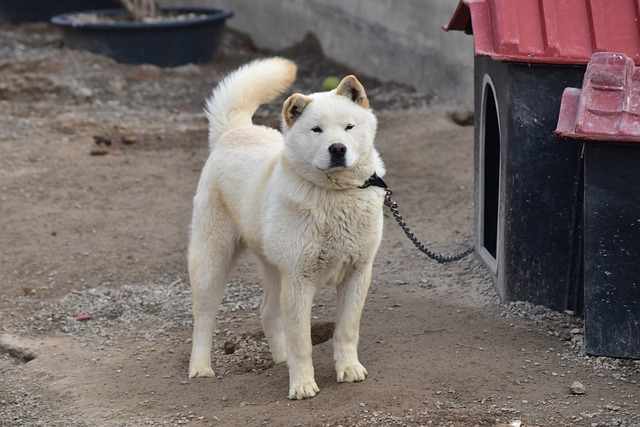


The Jindo is a medium-sized, independent, and intelligent dog breed that originates from South Korea. Known for its loyalty, hunting ability, and strong protective instincts, the Jindo is often described as a "one-person" dog that forms deep bonds with its family. The breed is agile, alert, and known for its quick reflexes and high energy. The Jindo is also famous for its loyalty, as it is often reported to return to its owner even after being lost for an extended period. Due to its intelligence and independence, the Jindo is best suited for experienced dog owners who can provide firm and consistent training.
The Jindo breed is believed to have originated on Jindo Island in South Korea, where it was primarily used for hunting. It is an ancient breed, with historical records dating back over 1,000 years. The Jindo was traditionally used for hunting game such as deer, wild boar, and rabbits, with a particular skill for tracking and retrieving. Over time, it became a symbol of loyalty in Korean culture and was even designated a national treasure in 1962. The breed's strong prey drive and keen hunting instincts are central to its history. While once primarily working dogs, Jindos are now also popular as companion animals in Korea and abroad. The breed gained recognition by the American Kennel Club (AKC) in 2018.
The Jindo is a well-balanced, athletic dog with a muscular, compact frame. Males typically weigh between 40 and 50 pounds, while females are slightly smaller, weighing 30 to 40 pounds. They stand about 18 to 22 inches tall at the shoulder. The breed has a thick double coat that comes in various colors, including white, red, black, brindle, and tan. Their coat is dense and weather-resistant, providing them with the protection they need when working outdoors. Jindos have a pointed, triangular-shaped ears and a thick, curled tail that rests over their back. Their eyes are almond-shaped and dark, giving them an alert and intelligent expression. Overall, the Jindo has a fox-like appearance, with a sleek, elegant build.
The Jindo is known for its independence, intelligence, and loyalty. While they form strong bonds with their families, they are often reserved around strangers. Jindos are very protective of their loved ones and can be wary of unfamiliar people, making them excellent guard dogs. However, they are not aggressive by nature and typically only become defensive when they sense a threat. This breed is highly intelligent and independent, often making its own decisions and thinking for itself. While they are generally good with children and other pets if raised with them, their strong prey drive can make them inclined to chase smaller animals. Jindos are known for their loyalty to their owners and may become deeply attached to one or two family members, making them ideal companions for those who can provide consistent training and attention.
The Jindo is an active and energetic breed that requires regular exercise to stay healthy and happy. As a working breed, they enjoy activities that allow them to use their agility, speed, and stamina. A daily walk, jog, or run is essential to keep them physically fit. Additionally, they enjoy interactive play like fetch or agility exercises that challenge their mind and body. Jindos have high energy levels and need at least an hour of exercise each day. Without sufficient physical and mental stimulation, they may become bored, which could lead to behavioral problems. It is important to provide them with opportunities to burn off excess energy in a safe, secure environment, as they are known to be skilled escape artists and may attempt to find a way out of a yard if not properly contained.
The Jindo is highly intelligent but can be independent and somewhat stubborn, making training both rewarding and challenging. Early socialization and obedience training are crucial to help them develop into well-adjusted adults. Jindos are known for being independent thinkers and may not always be motivated by food or praise, which can make training more difficult. However, they respond well to firm, consistent, and positive reinforcement methods. It is important to establish leadership and provide structure in training to prevent undesirable behaviors. Socialization with other dogs, people, and new environments should begin early to help prevent shyness or aggression, particularly towards strangers. Due to their protective nature, some Jindos may be cautious or aloof around unfamiliar individuals, but early exposure can help them become more comfortable in various situations.
The Jindo is generally a healthy breed with a lifespan of 12 to 15 years. However, like all breeds, they are prone to certain health conditions. Some common health issues in Jindos include hip dysplasia, patellar luxation, and allergies. Regular veterinary checkups are important to monitor their health and detect any potential problems early. Jindos are relatively low-maintenance when it comes to grooming, as their double coat sheds seasonally. Regular brushing during shedding periods can help manage loose hair and reduce shedding. Additionally, they should have their ears checked regularly to avoid infections, as their triangular ears can trap moisture and debris. Routine dental care and nail trimming are also necessary for their overall health and well-being.
The average lifespan of a Jindo is between 12 and 15 years. With proper care, a balanced diet, regular exercise, and routine veterinary visits, they can live a long and healthy life. It is essential to keep them at a healthy weight and provide regular physical and mental stimulation to ensure they stay active and fit as they age. Like many active breeds, they can develop joint problems, so it is important to monitor their health and make adjustments to their routine as needed to accommodate their age and physical condition.
© copyright Dog Compendium 2024 - 2026